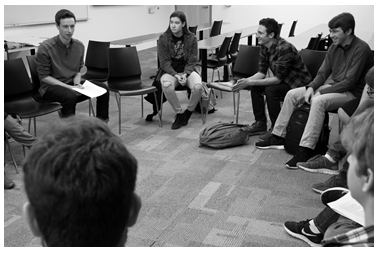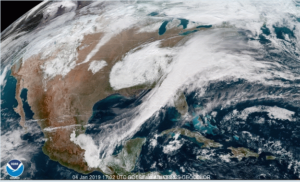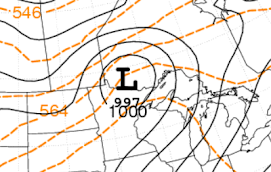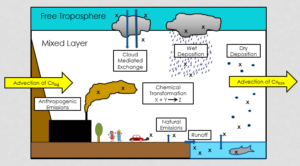ENGR 110: Design Your Engineering Experience
In this elective course, students have the opportunity to explore the breadth of opportunities available to engineers in both their education and their career. Students will have the chance to explore the foundations of the field and its influence on ourselves and the world we live in, as well as learn about the engineering majors offered at Michigan and the types of career paths available as an engineer. This course will also help students to identify their own interests and goals and discover the broader opportunities available through academic minors and co-curricular opportunities that align with their passions. At the end of thee course, students will actively incorporate this information into a plan for their educational experience in Michigan Engineering. [Fall Term]
Climate 414: Weather Systems
Image Source: NOAA
The overall goal of this course will be to help you gain an understanding of mid-latitude, synoptic scale weather systems. We will study the structure and the evolution of these weather systems, with the overall goal of obtaining a better understanding of the processes which impact their development. The term “weather systems” need not solely apply to synoptic scale phenomena, thus our goal will be to also look at a number of mesoscale phenomena (eg., supercells, tornadoes and hurricanes). [Winter Term]
CLIMATE 440: Meteorological Analysis Laboratory
This course provides an introduction into the analysis of both surface-based and remotely-sensed meteorological data. The development and application of operational numerical forecast models will be discussed. Techniques for the prediction of both synoptic and mesoscale meteorological phenomena will also be presented. [Fall Term]
CLIMATE 463: Air Pollution Meteorology
Over the past decade, considerable progress has been made in the reduction of anthropogenic pollution emissions, as well as the subsequent ambient concentrations. In time, however, we continue to discover new pollutants which are found to stress the human health and our physical environment. The understanding of the cycling of some species is complicated by the fact that these species have both anthropogenic (related to human activities) and natural emissions sources.
Meteorology represents one of the major influences that determines the scale and magnitude of the impact of releases of pollutants. This course will present an overview of pollutants of concern and the policies that have been put into place to control their impact on human health and the environment. This course will predominantly look at global, regional and local meteorological processes which control the transport, transformation and fate of anthropogenic pollutants. [Winter Term]




